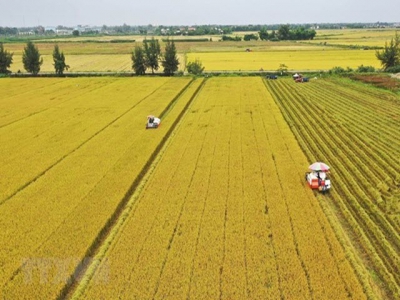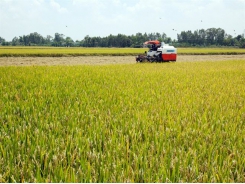Viet Nam needs market of agricultural land

HÀ NỘI — Agricultural land accumulation for large-scale production has been facing many obstacles, although the Government has pushed up the process by implementing several policies.
Agricultural land accumulation helps expand large-scale production. — Photo tapchitaichinh
The market for agricultural land is at an early stage of development, with many barriers in terms of land management and incentive policies.
In fact, the Government had introduced incentive policies which attracted many businesses to invest into agricultural production and helped increase economic efficiency.
The mechanism of flexible conversion of agricultural land use purpose, especially the regulations related to changing crops on rice fields, had contributed to improving the effectiveness of cultivated land.
Issuance of land use rights to agricultural land had created favourable conditions for the land owners to participate in the market, which was an important factor to promote agricultural land accumulation.
Complicated procedures
However, there have still been some shortcomings in the process of land accumulation.
Overlapping laws and legal documents and cumbersome administrative procedures had hindered businesses.
Đậu Anh Tuấn, an expert from the Việt Nam Chamber for Commerce and Industry (VCCI), said that the biggest concern of businesses in accessing agricultural land was administrative procedures.
The main reason was that the accessibility and accumulation of land by enterprises was limited. It was because domestic businesses were only allowed to lease land for agricultural production.
Meanwhile, foreign-invested businesses were also not permitted to receive transfers of agricultural land use rights, Tuấn said.
Capital contribution by land use rights was not feasible at the moment, because the capital protection policies of investors were not clear and complete, he said.
Additionally, land prices set by the Government were lower than the real prices in the market.
They were only 20-30 per cent of the market prices.
Notably, the information on land use planning and mechanisms for calculating land prices was still unclear and not transparent, which easily leads to land disputes.
The legal documents were overlapping and inconsistent, confusing enterprises, said the expert.
This also delayed agricultural projects, which caused high costs and risks for investors, he said.
Policy system needs improving
Hoàng Vũ Quang, vice director of the Institute of Policy and Strategy for Agriculture and Rural Development (Ipsard), said: “In order to establish and develop a market of agricultural land, the Government should have sufficient land laws and supporting policies.”
“Besides, as per experiences of countries with fully-developed agricultural land markets, Việt Nam needed institutions to provide infrastructure for transactions, such as an effective management system, funds and banks which have sufficient capacity for land fund development,” Quang said.
It was necessary to increase the public land lease term from five years to 20 years to encourage businesses to invest in long-term production, Quang said.
The Government should consider reducing or exempting taxes and fees for agricultural land use rights transfer and simplifying administrative procedures in agricultural land transactions, as well as setting up a monitoring mechanism for the land pricing and profit sharing between businesses and farmers in accordance with laws, he said.
Meanwhile, Tuấn said: “The Government should develop an agricultural land market where rights and interests of sellers and buyers are guaranteed and information is transparent.”
“The Government also needs to complete and update the land registration system and speed up an establishment of the national agricultural land database,” Tuấn added.
Nguyễn Trung Kiên, the Ipsard expert, said: “In many countries, they had institutions and organisations supporting the agricultural land market.”
The organisations rented land from farmers and then leased it to farms and businesses, Kiên said.
In other countries, farmers had to pay high taxes for abandoned land or have unused land revoked, he added.
Thus, Việt Nam should complete a system of agricultural land registration to help effectively manage the resource, the expert said.
A legal mechanism of capital contributions or bank mortgaging by land use rights must be set up soon, he said.
Related news
Tools

Phối trộn thức ăn chăn nuôi

Pha dung dịch thủy canh

Định mức cho tôm ăn

Phối trộn phân bón NPK

Xác định tỷ lệ tôm sống

Chuyển đổi đơn vị phân bón

Xác định công suất sục khí

Chuyển đổi đơn vị tôm

Tính diện tích nhà kính

Tính thể tích ao




 Rice farmers in Mekong Delta told to follow…
Rice farmers in Mekong Delta told to follow…  Bình Phước cashew processors face shortage of capital,…
Bình Phước cashew processors face shortage of capital,…